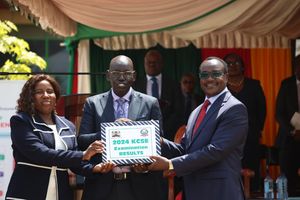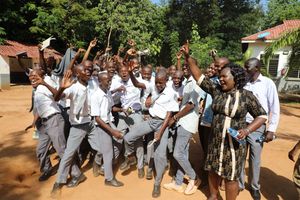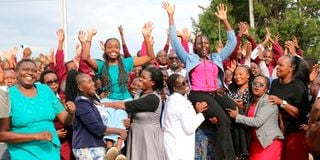
Teachers and students at Moi High School Kabarak on January 9, 2025, carry Nyaribari Michelle Kwamboka, who scored A Plain (82 points) and Linda Jerop A- (minus 74 points) as they celebrate the 2024 KCSE results. More than 30 candidates from the school scored A (plain)
The 2024 Kenya Certificate of Secondary Education (KCSE) surmounted various obstacles to post one of the best results in the examination since the famous reforms of 2016.
The class also recorded a number of firsts in the history of the KCSE examinations since the first candidates sat the test in 1989. There are three more classes left to undertake the KCSE examination which will effectively be phased out in 2027 to pave the way for competency-based assessment under the competency-based curriculum.
Since 1989, more males had always sat the examination but that changed this year when there were more females. Of the 962,512 candidates who sat the 2024 KCSE examination, 480,310 were male, while 482,202 were female, representing 49.90 and 50.10 per cent of the total candidature respectively.
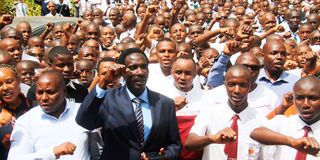
Kagumo High School Principal Silas Mwirigi leads his students in celebration on January 9, 2025 after the school scored an average of 9.543 in last year's KCSE exams.
The 2024 class should have sat the Kenya Certificate of Primary Education (KCPE) examinations in 2020 but this was delayed by outbreak of the Covid-19. They were the first class to sit national examinations in March instead of the traditional October – November examinations season, a point that was highlighted by the CEO of the Kenya National Examinations Council (Knec) David Njeng’ere.
Resilience
“It is worth noting that the candidates whose results we are releasing today sat their KCPE examination in March 2021, being the first cohort whose examination calendar was disrupted by Covid-19. We therefore commend them for their resilience thus this far,” Dr Njeng’ere said.
In the inaugural KCSE examination, only one candidate scored a mean grade of A (plain) compared to the 1,693 who had the top grade this year. That candidate was Naeem Samanakay, a student at Alliance High School. Naeem had also topped the inaugural KCPE examinations in 1985, after which he was awarded a four-year scholarship by Nation Media Group, then known as Nation Group of Newspapers.
In 1990, no single candidate scored a mean grade of A in the KCSE while in 1991, only two candidates had attained a mean grade of A.
The 2024 class has the highest number of candidates qualifying for university admission (246,391), an increase from 201,133 in 2023, scored a mean grade of C+ and above, the highest since the 2016 reforms instituted by then Education Cabinet Secretary Fred Matiang’i and Knec chairman George Magoha, who later became Cabinet Secretary.
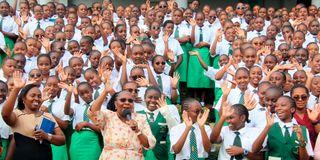
Bishop Gatimu Ngandu Girls Principal Jane Kimiti leads her school in celebration shortly after the KCSE results were announced on January 9. 2025.
The high number of qualifiers for university admission presents a fresh headache for the government which is already struggling to finance tertiary education. A funding model it introduced in 2023 for higher education has since been quashed by the High Court which declared it unlawful.
University admission
Education Cabinet Secretary Julius Ogamba did not indicate whether the government will sponsor all the candidates who qualified for university admission. This has been the case since 2016 and his silence on the matter is notable. Previously, due to the high number of qualifiers, the government used to set a cut-off point based on the number of students it would sponsor. Those who fell outside the cut-off point would go for self-sponsored programmes or private university education.
This was the second class to have a fewer number of subjects considered for grading after reforms effected in 2023. This followed recommendations of the Presidential Working Party on Education Reforms.
“The 2024 KCSE examination results have been graded using the reviewed grading system in which the overall grade at KCSE examination has considered mathematics, the best performed language among English, Kiswahili or the Kenyan Sign Language and the best performed five subjects,” said Mr Ogamba.
At the time, schools as well as candidates used to be ranked but the government has since stopped the practice, blaming it for enhancing a culture of unhealthy competition and malpractices. National and extra-county schools contributed the highest number of top grades, a situation Dr Njeng’ere said should not be surprising.
“It’s all about the placement of the entry behaviour. These are the candidates who scored 400 marks and above in KCPE. The question Kenyans should be asking is why there are only 1,375 straight As from national schools, considering their entry marks and the heavy investment in those schools. We should ask why anyone in a national school should score a mean grade of below C+,” Dr Njeng’ere told Nation.
The Knec boss commended the performance of sub-county schools (a majority of which are day), observing that they generally performed better than county schools.
“Their performance has debunked the myth that there is any advantage of going to boarding school. Sub-county schools are doing better than county schools which are all boarding. There’s no economic benefit and it’s a poor return-on-investment. When a child has the right entry behaviour and the school administration does things right, they’ll definitely do well. This is what we need to do as a nation; make sure every sub-county school has the right infrastructure and staffing. However, there may be some children who may need a boarding environment because of various reasons,” Dr Njenge’re said.
Sub-county schools have been struggling with inadequate funding and rely entirely on government funding which has been shrinking over the years. The schools are not allowed to charge fees since the government is supposed to fund every learner at Sh22,244 annually. This has been reduced recently to about Sh15,000.
Provisional results
In the 2024 edition, some of the top schools whose provisional results analysis Nation has obtained include Alliance Girls High School which had 89 candidates scoring straight As and 147 with A- (minus). The school has a mean score of 10.038. The Kenya High School which has also been consistently doing well in the KCSE examinations has a mean score of 10.131. 70 candidates at the school scored a mean grade of straight As while 114 others had A- (minus). It had a candidature of 382.

Hamid Ali Mohamed of Light Academy School in Mombasa is carried shoulder high after scoring A plain of 84 points in the just released Kenya Certificate of Secondary Education results on January 9, 2025.
47 candidates at Friends School Kamusinga had straight As and 111 had A- (minus). Riara Springs Academy has a mean score of 9.2 with a candidature of 116. 11 candidates at the school scored a mean grade of straight As while 15 had A- (minus). Five girls at Starehe Girls Centre had straight As and 18 others had A- (minus). Sunshine Secondary School principal Sally Cheyalam Kiprop told Nation the school had, 11 straight As.
By the time of going to press, most schools were still downloading the results and analysing them after the Knec website faced downtime during the day and slowed down the process. Dr Njeng’ere denied that the system had crashed, saying there was a lot of traffic due to too many people checking the results at the same time. He revealed that Knec would send schools the official printed results by the end of next week.
Mr Ogamba said that 17 out of the 30 subjects offered in the examinations recorded an improvement. These were Mathematics, alternative A and B, Biology, Physics, Chemistry, General Science, History and Government, Geography, IRA, Agriculture, Woodwork, Metalwork, Drawing and Design, Aviation Technology, Computer Studies, Kenya Sign Language, and Business Studies.
However, ten subjects recorded a drop in performance. These are English, Kiswahili, Biology for the blind, theory, Home Science, Building Construction, Electricity, French, Germany, and Music.
Female candidates recorded better mean score performance than male candidates in at least seven subjects. These are English, Kiswahili, Kenya sign language, French, home science, and Art and Design.
On their part, male candidates recorded better performance than female candidates in 23 subjects: Mathematics Alternative A and B, Biology and Biology for the Blind, Physics, Chemistry, General Science, History and Government, Geography, Islamic Religious Education, Woodwork, Metalwork, Building & Construction, Power Mechanics, Electricity, Drawing & Design, Aviation Technology, Agriculture, Computer Studies, German, Arabic, Music and Business Studies.

